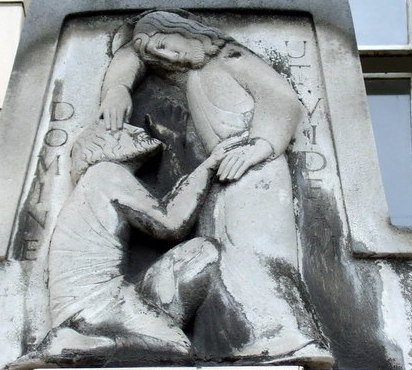by Maria Evans
AM Psalm 102; PM Psalm 107:1-32
2 Samuel 15:19-37; Acts 21:37-22:16; Mark 10:46-52
AM Psalm 102; PM Psalm 107:1-32
2 Samuel 15:19-37; Acts 21:37-22:16; Mark 10:46-52
What an interesting juxtaposition we have today in our reading from Acts and our Gospel reading from Mark! Bartimaeus evidently had been blind for some time, enough he’d had to turn to begging; Paul-formerly-Saul could see until he met Jesus on the road to Damascus and was suddenly and temporarily blinded.
When I hear both these stories, I can’t help but also drag in the story from John 9, of the man born blind. I often imagine how difficult it must be, at times, to explain something to someone blind at birth in a way they can “see” it. It’s easy enough to explain what a camel or a donkey looks like by letting them feel the animal from stem to stern, but how does one help someone “feel” a sunset? A meteor shower? A thunderstorm? Similar explanations are no problem to someone like Paul; he would have the ability to “see” by memory. I wonder how many things were starting to get shaky for Bartimaeus. Could he no longer recall certain faces, or the simple beauty of some common sight? What used to be there that was no longer in his recall?
Yet, in other ways, the man born blind is the one with an advantage when we look at these three forms of blindness. As someone born blind, he probably developed the means to still get where he needed to go, even if the boundaries of his world were limited. He probably learned to count his steps to get to certain places, and to listen for certain things to affirm his sense of where he was. He probably couldn’t always count on someone helping him. Bartimaeus had probably learned a little in this regard, also. Paul, having been suddenly blinded, would have had no practice in those techniques. He is totally dependent on the generosity of others to get where he needs to go.
I wonder, when one is born blind and can suddenly see, how many of the things he or she saw didn’t match up at all with how one imagined them, and how many had been perceived fairly right.
I wonder what it felt like for Bartimaeus, whose deepest desire was only to see again, to hear the jeers of the crowd, who treated him as less than whole, for what was certainly not an unreasonable desire.
I wonder, when Ananias healed Paul’s blindness, what he saw differently. How did the light of Christ shining in his eyes change the way he once thought he saw things? Was it like how I once heard someone who needed prism lenses the first time she wore them, when she looked at me and said, “I didn’t know everything was so three-dimensional!”?
As I ponder these things in the context of the events in Charlottesville, VA this past weekend, I am struck at just how blind I probably am in some places, even though I consider myself a not terribly race-focused person. How blind any of us are, no matter what our color. I imagine in some of those places, we were born as blind as the blind man in John, as a consequence of our color or our social situation. I suppose if we are fortunate enough to be healed enough to see, we will be surprised to discover what the things we never saw look like. We might see we got some of it smashingly wrong; at the very least, we might discover what we never even knew existed.
When I think about Bartimaeus’ situation, I wonder how many things we “saw” as children, without a second thought, in our understanding of the good within human beings, faded from our memory, as we were taught that certain groups of people “were not like us,” whether those teachings were accidental or on purpose.
At the same time, I think about those times when the light that is Jesus temporarily strikes us blind–blind with confusion and unrest as what we took for granted is no longer there. Can we let go of self and our closely held notions of things the way we’ve always believed them, and trust those accompanying us on the journey to guide us? Are we ready to be healed with God’s help by people we never even knew until we are on the verge of being healed?
My teacher, let us all see again.
Maria Evans splits her week between being a pathologist and laboratory director in Kirksville, MO, and gratefully serving in the Episcopal Diocese of Missouri as a Priest Associate at Church of the Good Shepherd and Chaplain of the Community of St. Brigid, both in Town and Country, MO.
Image: By ceridwen, CC BY-SA 2.0, Link

